Mattel Bundle
Who Really Controls the Toy Empire?
Ever wondered about the forces shaping the future of your favorite toys? The answer lies in understanding 'Who Owns Mattel Company?'. From the iconic Barbie to the revved-up Hot Wheels, Mattel's brands have captivated generations. Unraveling Mattel ownership reveals the key players influencing its strategic decisions and market dominance.
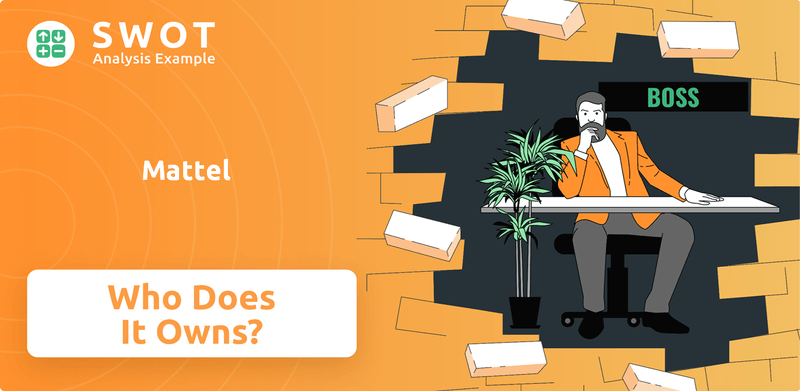
The Mattel SWOT Analysis can provide a comprehensive look at the company's strengths, weaknesses, opportunities, and threats, which are all influenced by its ownership structure. Understanding Mattel's history, from its founding to its current market position, is crucial. Exploring 'Who owns Mattel' is essential for investors, analysts, and anyone interested in the toy industry's dynamics, including questions like "Who is the current CEO of Mattel?" and "What companies does Mattel own?".
Who Founded Mattel?
The story of Mattel began in 1945, a venture co-founded by Harold 'Matt' Matson and Elliot Handler. Initially, the business operated from a humble garage in Southern California, setting the stage for what would become a global toy empire. The early focus was on picture frames, a temporary pivot before the company embraced its true calling: toys.
Early on, Ruth Handler, Elliot's wife, joined the company, playing a pivotal role in shaping its future. While the precise initial equity split isn't extensively documented, it's known that Matson soon sold his share to the Handlers due to health reasons. This transition solidified the Handlers' control, setting the stage for their vision to take flight. The core of the company's early success was built on this foundation.
Ruth Handler's influence was particularly significant, especially with the introduction of the Barbie doll in 1959. This innovation revolutionized the toy industry. The initial financial backing likely came from the founders' personal funds and potentially small loans, as was typical for startups of that era. Beyond Matson's early departure, there is no widely available information about significant early ownership disputes or buyouts.
The founders of the Mattel company, Harold 'Matt' Matson and Elliot Handler, along with Ruth Handler, were the initial key figures in the company's ownership. The Handlers' vision drove the company's strategic direction. The early focus on innovation and brand building was deeply embedded in the company's structure.
- Harold 'Matt' Matson co-founded the company.
- Elliot Handler was a co-founder.
- Ruth Handler, Elliot's wife, played a crucial role.
- The Handlers' vision shaped the company's direction.
Mattel SWOT Analysis
- Complete SWOT Breakdown
- Fully Customizable
- Editable in Excel & Word
- Professional Formatting
- Investor-Ready Format
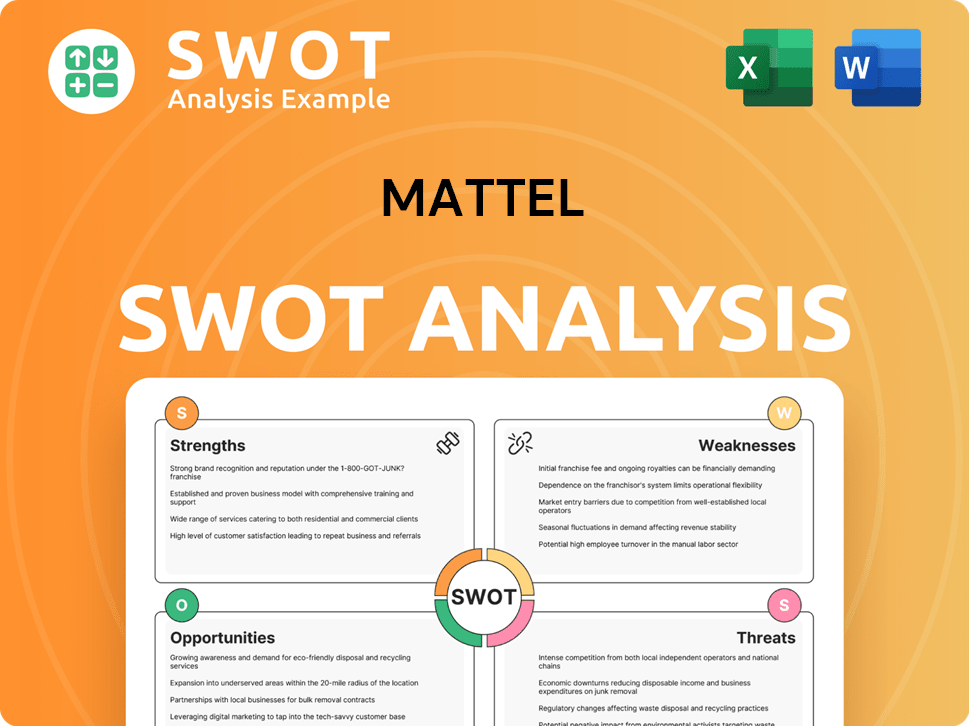
How Has Mattel’s Ownership Changed Over Time?
The evolution of ownership for the toy giant, Mattel, began with its initial public offering (IPO) on the New York Stock Exchange (NYSE) in 1960. This transition from private to public ownership marked a pivotal moment in the company's history. Over the years, the ownership structure has transformed, with a significant shift towards institutional investors, mutual funds, and index funds. Understanding the shifts in ownership is crucial for anyone interested in the Marketing Strategy of Mattel and its overall business direction.
As of early 2025, major institutional shareholders significantly influence Mattel's strategic decisions. These include prominent investment management firms like The Vanguard Group and BlackRock. For example, The Vanguard Group held approximately 11.0% of Mattel's outstanding shares as of December 31, 2023, and BlackRock held around 7.8%. This concentration of ownership in the hands of institutional investors reflects a broader trend in publicly traded companies, where passive and active funds manage substantial stakes on behalf of their clients.
| Shareholder | Approximate Percentage of Shares (as of December 31, 2023) | Type of Shareholder |
|---|---|---|
| The Vanguard Group | Approximately 11.0% | Institutional Investor |
| BlackRock | Around 7.8% | Institutional Investor |
| Capital Research Global Investors | Data Not Readily Available | Institutional Investor |
While no single individual or family maintains a controlling interest in Mattel, key insiders, including executive officers and members of the board of directors, hold a smaller but notable percentage of shares. These shifts in major shareholding have influenced Mattel's strategy, often leading to an increased focus on shareholder value, operational efficiency, and strategic brand management. The current CEO of Mattel is Ynon Kreiz. Mattel's stock symbol is MAT, and the company's headquarters are located in El Segundo, California. Founded in 1945, Mattel has grown to own several popular brands, including Barbie, Hot Wheels, and Fisher-Price. The company's mission statement focuses on creating innovative products and experiences that inspire, entertain, and develop children.
Mattel's ownership has evolved significantly since its IPO in 1960, with institutional investors playing a dominant role.
- The Vanguard Group and BlackRock are among the major institutional shareholders.
- Executive officers and board members also hold shares, though in smaller percentages.
- These ownership dynamics influence Mattel's strategic decisions and focus on shareholder value.
- Understanding the ownership structure provides insights into the company's direction and priorities.
Mattel PESTLE Analysis
- Covers All 6 PESTLE Categories
- No Research Needed – Save Hours of Work
- Built by Experts, Trusted by Consultants
- Instant Download, Ready to Use
- 100% Editable, Fully Customizable
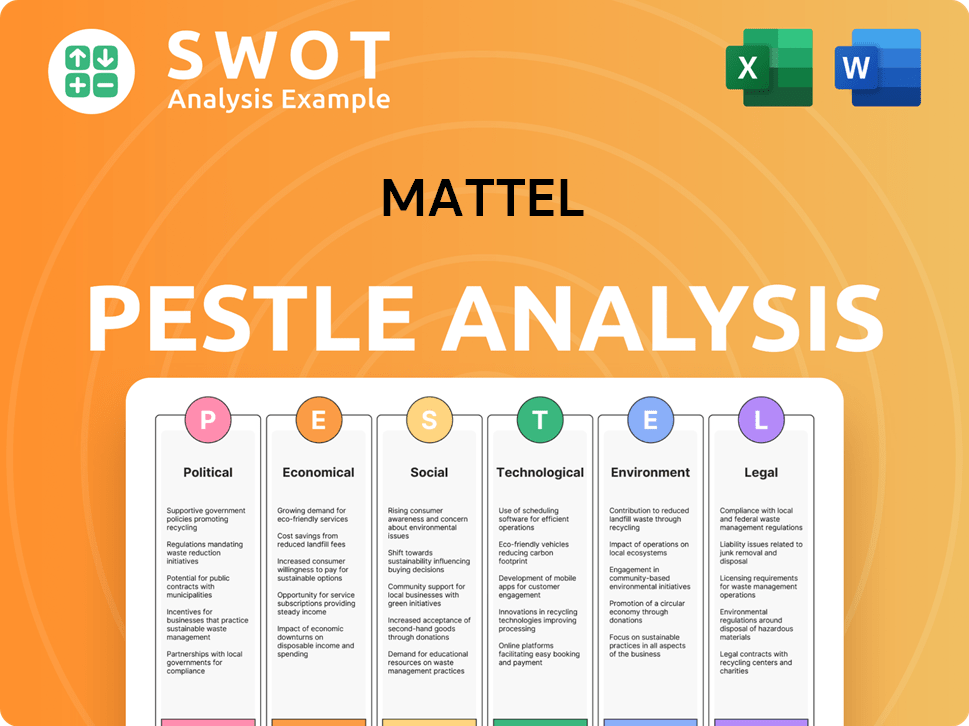
Who Sits on Mattel’s Board?
The current Board of Directors at Mattel plays a vital role in overseeing the company's operations. As of early 2025, the board includes a mix of independent directors and executive directors. The board's composition is designed to represent various interests, ensuring a balance between shareholder perspectives and independent oversight. Specific representatives of major institutional shareholders are not always explicitly listed as board members.
The structure of the board and its strategic decisions are constantly under review by shareholders. This ongoing scrutiny influences corporate governance and decision-making processes. While there haven't been any major proxy battles widely publicized in 2024-2025, the board's actions are closely watched by investors. The company's performance and strategic direction are key areas of focus for shareholders.
| Board Member | Title | Affiliation |
|---|---|---|
| Ynon Kreiz | Chairman and CEO | Mattel |
| Richard Dickson | President and COO | Mattel |
| Dawn Ostroff | Independent Director | Spotify |
Mattel operates under a one-share-one-vote structure. This means that each share of common stock grants the holder one vote on matters submitted to a shareholder vote. There are no widely reported dual-class shares or special voting rights that give outsized control to particular individuals or entities. This structure ensures that all shareholders have voting power proportional to their ownership stake in the company.
The board of directors at Mattel oversees the company's strategic direction and financial performance. The board includes a mix of independent and executive directors. Shareholders closely monitor the board's actions, influencing the company's governance. Read more about the Growth Strategy of Mattel.
- The board includes both independent and executive directors.
- Shareholders have voting power proportional to their ownership.
- The company's financial performance and strategic direction are key areas of focus.
- The board's decisions are under constant review by shareholders.
Mattel Business Model Canvas
- Complete 9-Block Business Model Canvas
- Effortlessly Communicate Your Business Strategy
- Investor-Ready BMC Format
- 100% Editable and Customizable
- Clear and Structured Layout
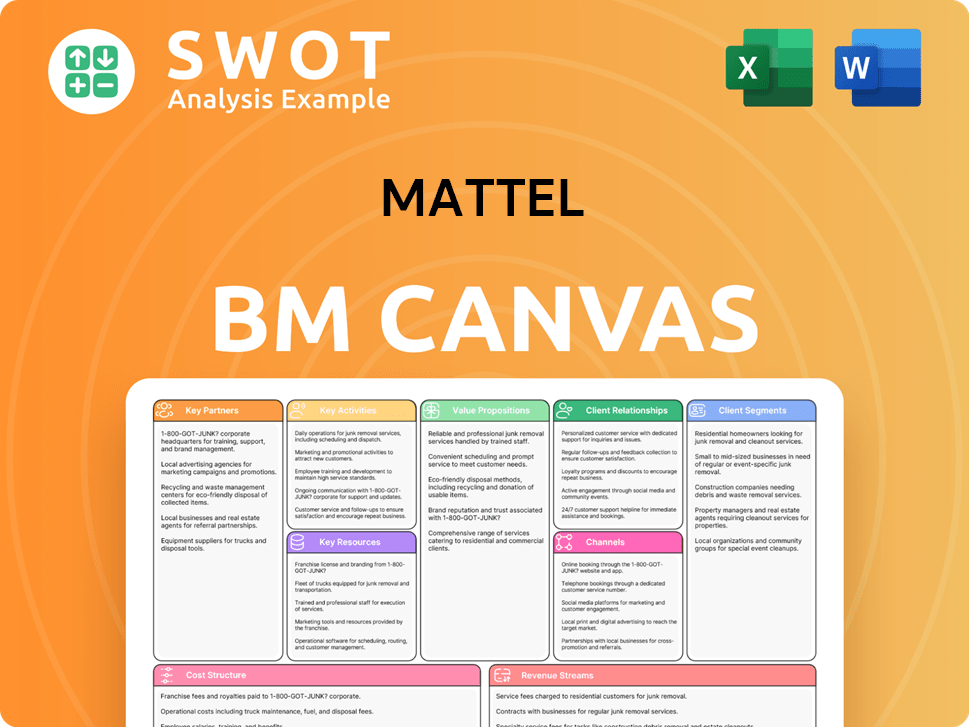
What Recent Changes Have Shaped Mattel’s Ownership Landscape?
In recent years, the ownership landscape of the Mattel company has seen some shifts, influenced by market dynamics and strategic initiatives. The success of the Barbie movie in 2023 significantly boosted the brand's value and stock performance, which indirectly impacted investor sentiment. While there haven't been major share buybacks or secondary offerings reported that dramatically altered the ownership structure in 2024-2025, the company has focused on optimizing its portfolio and intellectual property.
Industry trends, such as increased institutional ownership, remain prevalent, with large asset managers continuing to hold substantial stakes in Mattel. Founder dilution is a natural progression for publicly traded companies as they mature and raise capital. There have been no public statements by the company or analysts in 2024-2025 about planned succession that would drastically change ownership or potential privatization/public listing. Mattel's ownership structure continues to reflect a broad base of institutional and individual investors focused on long-term growth and brand strength.
| Metric | Value (2024-2025) | Notes |
|---|---|---|
| Stock Symbol | MAT | Publicly traded on the NASDAQ |
| Institutional Ownership | Approximately 80% | Estimate based on recent filings |
| Market Capitalization | Approximately $6.5 billion | As of October 2024 |
The Mattel company continues to navigate the evolving toy market, with its ownership structure reflecting a broad base of institutional and individual investors focused on long-term growth and brand strength. For more detailed information, check out this article about Mattel ownership.
Major institutional investors hold significant stakes in Mattel. These include large asset management firms and investment funds. Their ownership reflects confidence in the company's long-term strategy and brand value. This ownership structure supports stability and strategic direction.
Institutional ownership has been a consistent trend in recent years. The company's performance, particularly after the Barbie movie, has likely influenced investor sentiment. The focus remains on brand strength and portfolio optimization. These trends signal a stable ownership base.
The success of the Barbie movie in 2023 had a positive impact on Mattel's stock performance. This led to increased investor interest and potentially influenced ownership dynamics. The movie's success highlighted the strength of the brand.
Mattel is expected to continue focusing on its portfolio and brand strength. The company's ownership structure will likely remain stable, with institutional investors playing a key role. The company's strategic initiatives will shape future ownership trends.
Mattel Porter's Five Forces Analysis
- Covers All 5 Competitive Forces in Detail
- Structured for Consultants, Students, and Founders
- 100% Editable in Microsoft Word & Excel
- Instant Digital Download – Use Immediately
- Compatible with Mac & PC – Fully Unlocked
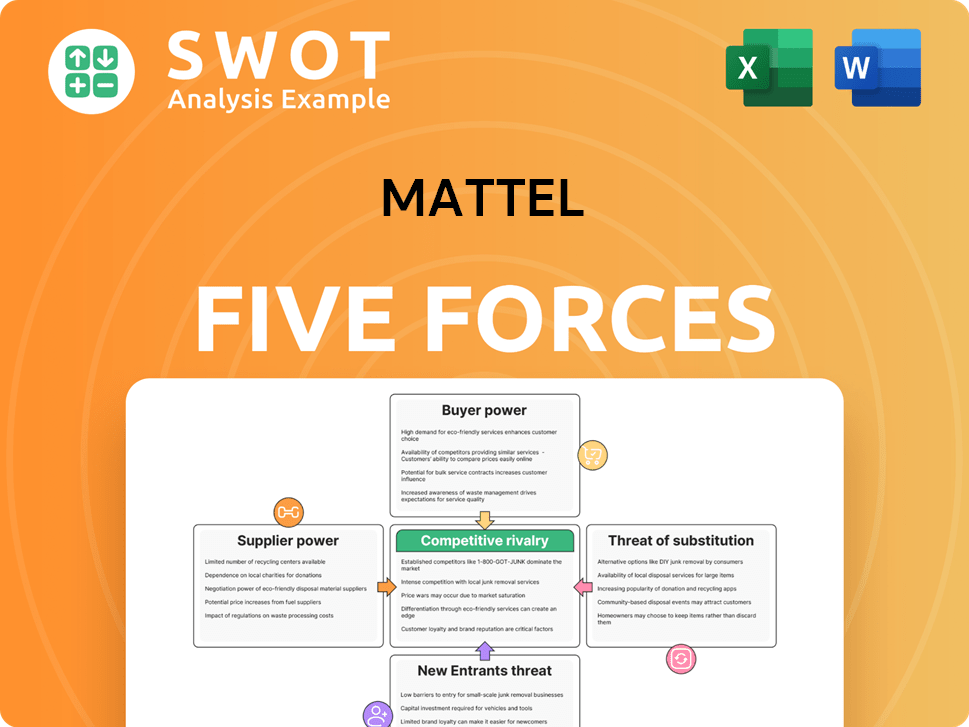
Related Blogs
- What are Mission Vision & Core Values of Mattel Company?
- What is Competitive Landscape of Mattel Company?
- What is Growth Strategy and Future Prospects of Mattel Company?
- How Does Mattel Company Work?
- What is Sales and Marketing Strategy of Mattel Company?
- What is Brief History of Mattel Company?
- What is Customer Demographics and Target Market of Mattel Company?
Disclaimer
All information, articles, and product details provided on this website are for general informational and educational purposes only. We do not claim any ownership over, nor do we intend to infringe upon, any trademarks, copyrights, logos, brand names, or other intellectual property mentioned or depicted on this site. Such intellectual property remains the property of its respective owners, and any references here are made solely for identification or informational purposes, without implying any affiliation, endorsement, or partnership.
We make no representations or warranties, express or implied, regarding the accuracy, completeness, or suitability of any content or products presented. Nothing on this website should be construed as legal, tax, investment, financial, medical, or other professional advice. In addition, no part of this site—including articles or product references—constitutes a solicitation, recommendation, endorsement, advertisement, or offer to buy or sell any securities, franchises, or other financial instruments, particularly in jurisdictions where such activity would be unlawful.
All content is of a general nature and may not address the specific circumstances of any individual or entity. It is not a substitute for professional advice or services. Any actions you take based on the information provided here are strictly at your own risk. You accept full responsibility for any decisions or outcomes arising from your use of this website and agree to release us from any liability in connection with your use of, or reliance upon, the content or products found herein.